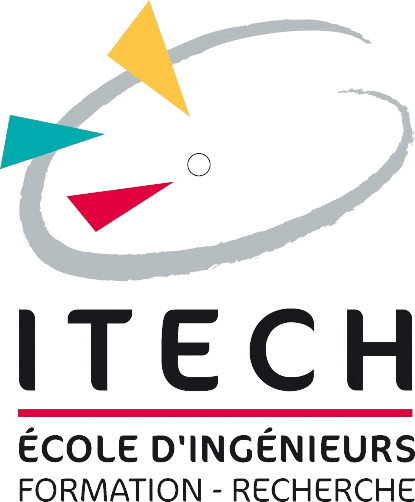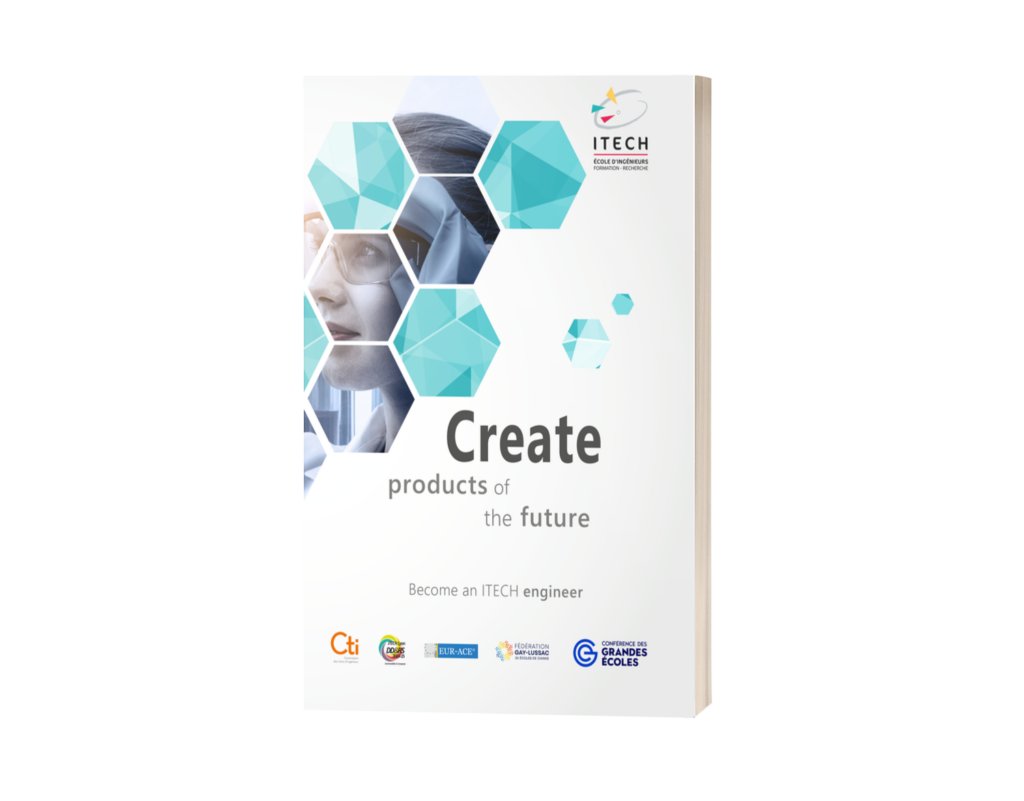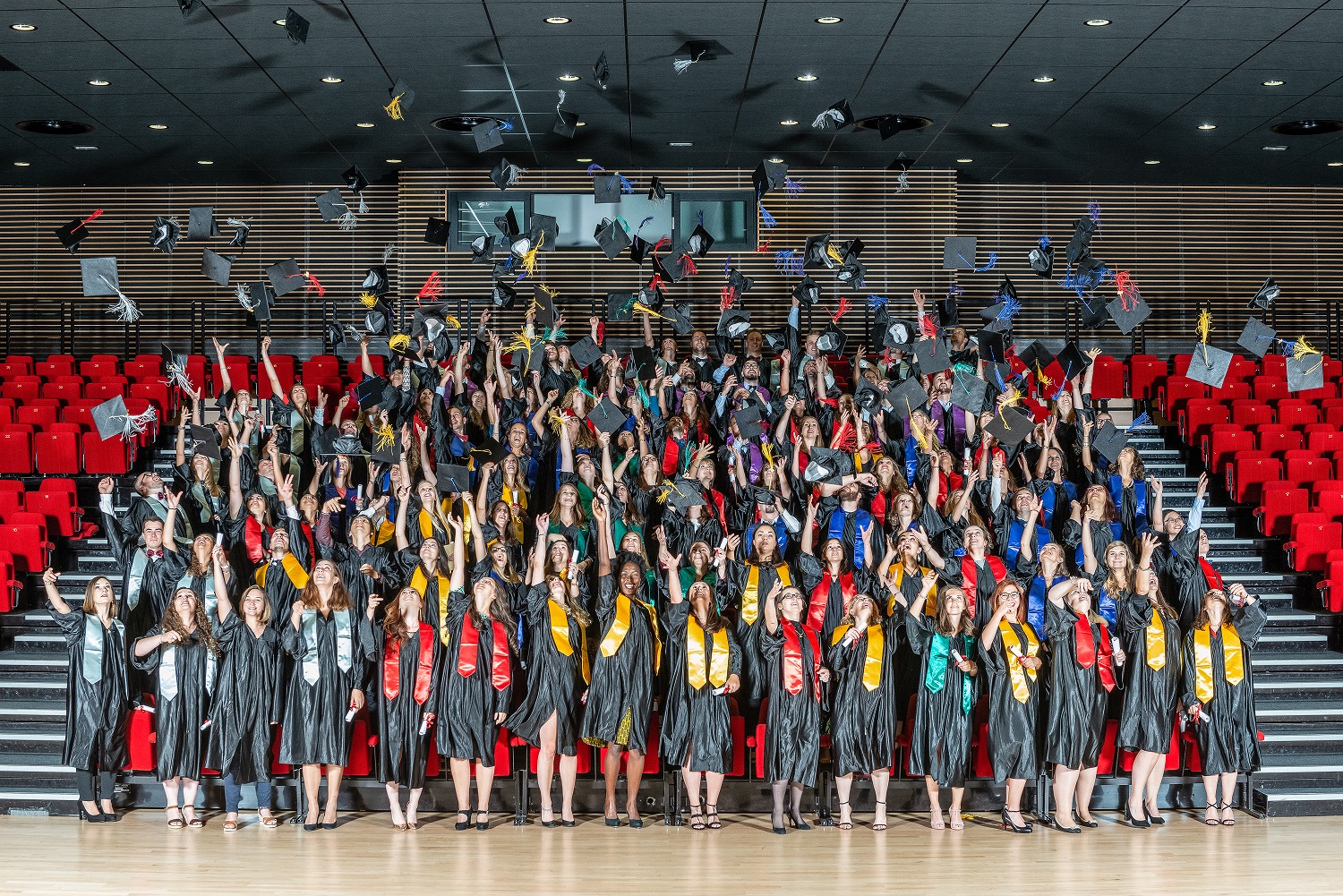ITECH Lyon, a member of the Conférence des grandes écoles, trains engineers in our different areas of expertise. The Master of Engineering in Applied Chemistry or diplôme d’ingénieur in French, is a master’s-level engineering degree.
Find out more about the campus, majors of specialization, labs and the academic program, not forgetting the city of Lyon.
Program
The Master of Engineering in Applied Chemistry combines cutting-edge scientific training with a strong foundation in social sciences, humanities, and economics. In the first year, students strengthen their scientific knowledge while exploring engineering’s broader context and completing an international experience. The program offers a second year focused on polymer science, a semester abroad, and specialized majors. Students apply their skills through internships in real-world industrial settings. In the third year, students participate in an industrial research project and deepen their expertise, culminating in a 6-month internship that prepares them for a successful career in applied chemistry.
Students can choose to follow the English-taught program starting in the second year, or the French-taught program in either the first or second year. Since both programs share the same curriculum, students have the flexibility to switch languages either midway through the second year or at the beginning of the final year.
Majors
All four of ITECH’s majors are taught in English or French: Formulation Chemistry, Plastic Materials, Textile Materials and Leather Manufacturing.
Formulation Chemistry
Students in this major learn to formulate paints and vernishes, inks, adhesives, and cosmetics. They select the different raw materials and develop the manufacturing process so that the final product meets the specitifications both in terms of use and technical, regulatory, and environmental characteristics.
Plastic Materials
In addition to their knowledge of polymer raw materials, ITECH engineers master the eco-design of plastic parts and all the techniques for implementing and characterizing these materials (from the design of tools to the management of production in the transformation workshop).
Textile Materials
Thanks to their mastery of raw materials (natural, artificial, and synthetic) and of all the stages in the manufacture of a textile (spinning, weaving, knitting, finishing, garment making), ITECH engineers are able to develop innovative textile materials, orchestrate manufacturing and quality control, while always seeking the best environmental practices. The skills are developed through teaching in close collaboration with companies located in the technological hub of Roanne.
Leather Technology
ITECH Lyon is the only institute to train engineers in the field of leather. ITECH offers a comprehensive education convering the transformation of the material (from waste hides to the noble material) right up to its use (footwear and leather goods). Thus, ITECH engineers master all the stages of the industry, from chemical aspects to industrial processes.
Curriculum
To see the academic program by semester and specialization, please click on the buttons below:
The curriculum shown may be subject to change.
Evaluation methods
The different subjects making up the competency blocks are assessed through practical work, case studies, reports, and presentations. A comprehensive evaluation of the competencies is carried out in collaboration with the host company during the end-of-studies internship. The grades obtained validate the ECTS credits.
Certification validation is subject to:
- A professional experience in an industrial or research structure in the fields of formulated products, textiles, leather, or plastic materials
- The validation of 4 competency blocks representing a total of 180 ECTS credits
- Obtaining a minimum B2 level (CEFR) in English
- Obtaining a minimum B1 level (CEFR) in French*
- An international experience
*For international students whose mother tongue isn’t French and who are enrolled in the English-taught program.
Application and admission
Admission into 1st year
Admission into 1st year of the Master of Engineering in Applied Chemistry is available through the study of your application file and an interview.
Academic requirements
Students who have completed 2 to 3 years (or more) of university studies in chemistry (bachelor’s degree or equivalent) are eligible for an entry in first year of the engineering program.
Language requirements
- French-taught program: a B2 level in French is required for this program. An official certificate is not required (the level is tested during the admissions interview), but is highly appreciated.
Admissions process
If you are applying into 1st year, depending on your nationality, your country of residence, you can apply via ITECH Lyon’s platform or via the Études en France platform. For further details on the admission process, please read Admission for international students.
If you are a non-European student currently living outside of France, we strongly recommend that you submit your application between January and mid-March.
Admission into 2nd year
Admission into 2nd year of the Master of Engineering in Applied Chemistry is available through the study of your application file and an interview. Starting this year, it is possible to apply for admission into the English-taught program.
Academic requirements
Students who have completed at least 4 years of university studies in chemistry (4-year bachelor’s degree, licenciatura/pregrado, master’s degree, etc.) are eligible for an entry directly in second year of the engineering program.
Language requirements
- English-taught program: a B2 level in English is required for this program. An official certificate is not required (the level is tested during the admissions interview), but is highly appreciated.
- French-taught program: a B2 level in French is required for this program. An official certificate is not required (the level is tested during the admissions interview), but is highly appreciated.
Admissions process
You can only apply via ITECH Lyon’s platform. For further details on the admission process, please read Admission for international students.
If you are a non-European student currently living outside of France, we strongly recommend that you submit your application between January and mid-March.
Tuition fees
Tuition fees are €8,300 per year for students enrolling in 2024. They can be paid in several installments throughout the year.
Career outcomes
ITECH engineers hold positions in R&D, production, quality, consulting, CSR, among others.
Frequently Asked Questions
What are the admission requirements?
The admission criteria for the Master in Applied Chemical Engineering depend on the year of entry.
- 1st Year Admission: Applicants must have completed at least 2 years of university-level studies in Chemistry (or a related field) and have a B2 level in French (program in French).
- 2nd Year Admission: Applicants must have completed at least 4 years of university-level studies in Chemistry (or a related field) and have a B2 level in English (English program*) or in French (French program).
*Available only from the 2nd onwards.
Can I apply for direct admission into the 2nd year?
Yes, if you have completed at least 4 years of university-level studies in Chemistry (or a related field), you can apply directly to the 2nd year of the engineering program.
How much does the program cost?
Tuition fees for the Master of Engineering in Applied Chemisry are €8,300* per year.
*For the academic year 2025-2026
What documents do I need to apply?
Each application file must contain a CV*, a cover letter*, your academic transcripts*, and your university diploma*/enrollment certificate*. Additional documents, such as language proficiency certificates and recommendation letters, are welcome but not mandatory.
*In English or French.
Do I need a language proficiency certificate to apply?
While welcome, an official language proficiency test is not required. Your language skills will be assessed during the admission interview, conducted in the program’s teaching language.
What services does ITECH Lyon offer to international students?
The International Relations team provides a variety of services to assist international students upon arrival and during their stay in France:
- Visa procedure assistance before arrival
- Accommodation service
- Welcome Day
- Assistance with administrative procedures in France
- Activities to explore Lyon and connect with other international students



